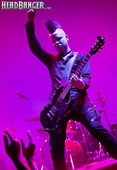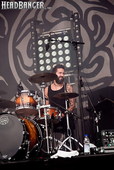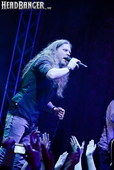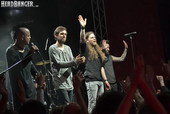Diary Of Dreams
We Sound Live Pretty Different
02.02.2017
Архив интервью | Русская версияFor Diary of Dreams’ frontman, founder and ideologist, known under the meaningful alias Adrian Hates, the year 2017 promises to be full of events. February will see the band going out on the road, including a visit to Russia; their long-expected new album is going to be released after a few months’ delay; in the end of the year, the musician is planning some other mysterious activities of which he’d like to keep quiet for now. And even Adrian’s side project is going to issue new material. Shortly before the Russian gigs, scheduled for February 17 in Moscow and February 19 in St. Petersburg, we got Mr. Hates on the phone in order to discuss, how his year had started, what had happened to the new album of the band, why live recordings are important and whether any members of the band may change in the future.
Let’s start with something recent. I saw on Facebook that this January you were DJ-ing at a Pink Floyd tribute night in Dubai. Can you tell us a bit what that was and how it came about?
Some time ago we had a pleasure to meet the promoter who was organizing that party. She had the idea, knowing that I am a big fan of Pink Floyd, to invite me to play a DJ-set for their tribute in Dubai. I obviously thought that it was a great opportunity. I went there and I had a fantastic time. It was also my first time in the city and I had a chance to have a proper walk there. It’s a young city. You know, it differs from Moscow or St. Petersburg or from German cities. Those are cities with a very-very long history. We had a chance to look around and you know, it’s like Disneyland. I really enjoyed it. Was great!
When did you actually start DJ-ing? Do you take it as a serious occupation, or is that more like a hobby to you?
To begin with, there are many types of DJs. There are very artistic DJs like the ones in the techno industry, the DJs who more likely make new songs by combining different sets and stuff. That is an art form. What I do and what the DJs in this show all pretty much do is spinning CDs, mixing them between each other, making a nice mood, making a nice choice and representing our own personal tastes. I am not a brilliant artist in the form of DJing. I’m a good proper DJ, I would say, but I would not put myself up there among the big scale super-talented DJs. There are much better people there than I am. But I think a lot of people enjoy having somebody they know, somebody whose music they listen to, and see and hear what he is doing when DJing. So I started pretty early. I don’t know when exactly but at least 15 years ago. Sometimes I played more frequently, sometimes – less, depending on how much time I had. But I played many countries and many-many cities. So far people keep booking me, so I think it can’t be so bad. And I can adapt very much. At this Pink Floyd event I obviously did not go into that harsh evil industrial stuff, it was more like rock and guitars. It’s a nice thing to surprise yourself and to push your own physical horizon. It’s a good thing to do next to the actual music writing.
It should be a completely different perspective for you as a musician.
Yeah because as a musician on stage you just do whatever you want, and as a DJ you have to learn a few compromises and adapt to the most of your audience, and what they want to hear is important to the result of the evening – so you better be kind! (laughs)
I just cannot but ask you what is going on with the new album of Diary of Dreams. I know its release has been postponed.
It’s going well. I know that the outward appearance might be different from what is going on inside here, but you know, I’m getting older, and in the past years we reached that point shortly before the end of the production where I ended up working 15 hours a day seven days a week for several weeks and sometimes even months. And now I reached this point again. It was in autumn last year. And I figured this can’t be right. I did not feel comfortable doing this again and I did not feel comfortable making compromises on point saying that okay, there is only enough time for one video or only enough time for one photo shoot. I think that the new material is so great. I have lined-up – I can have a look later because I am sitting in the studio right now - I think over 50 songs and I am just in the process of choosing the right material.
And what I also did in autumn last year is I changed my complete production. This means my old computer is now on holiday forever and I have a new one. I re-installed everything and I bought a lot of new stuff and new programs, keyboards. I worked on a lot of new endorsements and artists’ arrangement partners that give me support with equipment. And this is also important. I wanna have these new instruments and these new technical abilities on the new album, because it always brings a fresh wind. And it always brings challenge. Working on new material is a little like getting a new spark, a new addiction. So we’ve been working hard, we’re very-very happy, can’t wait to switch it all up! And I think within February I should be done.
But the release date is nevertheless pushed back to the later period, right?
That’s because the original plan was to release the album in the beginning of this year. And that I am not going to do. I am going to release it at some point after this summer. I can’t tell you the exact date. But I want to do it right. I want to release at least two videos and I want fantastic photoshoots in several places of this planet. I just want to do things differently. And I have a new team lined up which is exciting, because everybody is so hungry and so thirsty and so eager to do things, to change things, to give an impact and to be the part of this whole thing. And it catches me.
I just want to go back to the thing you said earlier: that you already have 50 tracks and you are currently in the process of selecting the right ones. I remember in an interview that you did in 2015 soon after the release of your previous album “Grau im Licht” you stated that you had already started writing new material. This made me wonder about your creative process. Does that mean that the new album is anyhow connected with the previous one or are you generally writing songs non-stop so you always keep this process going?
That’s correct. The production and writing processes are continuous. They never stop. I know a lot of musicians get together for the new album and start writing songs. To me this is similar to a 9 to 6 job, you know, job routine. Like you sit together, you talk about stuff that you work on. To me that would kill the magic of music. Everybody have their own procedure and their own ways of doing things, and that’s totally fine, I am not saying that they’re doing it wrong, but to me this would not work, this would totally limit my creativity. Because the moment when I am inspired, when I have an idea, I need freedom to work on it that very moment, not write it down, make sketches or whatever and start working on it in three months. Otherwise the magic of that idea would be gone. It’s like a breeze, like a fresh wind that you had for a moment. Of course I also write down some ideas because they may appear in different times, sometimes even on stage, but then I remember the moment and try to catch it somehow. So yeah, for me it’s a continuous process, I always write music and I never stop doing that, it’s just sometimes it is getting a bit difficult. I think I haven’t been doing before some average things: these over 50 songs that I have left over from before, are part of a bigger number that I have deleted.
So are they going to stay with you afterwards? Once you select songs for the album, you will keep the rest and might use them later one day, right?
Exactly. Some of them I drag along. A very good example is “The Colors of Grey”. It was meant to be for the previous album to the one on which it actually turned on. But it was the right decision. I knew when I heard it. So I kept it at the back of my mind for the next album. Sometimes it is just good to let things ripen and give them a little time. Your perspective on the song is maybe not that under pressure anymore a year later. But I have a closer choice of course for the new album – there are about 15 or 20 songs that I have in mind and that would probably end up on the album.
I am looking forward to it! You also recently issued the “reLive” album which is a recording of your gigs that took place in Hamburg, Leipzig and Berlin in November 2016. What do you remember about those gigs and do they stand out anyhow in your memory?
Of course choosing these places, to begin with, was something we did very much on purpose. We knew very well what we can expect from those audiences. They are very good, very enthusiastic, very supportive. Then, I do remember very much some little details of the concerts, because of course knowing at the back of your head that this very second is being recorded puts you under a different pressure than on other concerts. I really like it when it’s not the first job that we record. Typically I like when we record concerts in the middle of a tour. Towards the end your voice is maybe not 100% anymore, but in the middle you’re in a very good condition and the voice is perfectly warmed-up. So there are a lot of different reasons why I choose certain gigs. Besides that, I know very well, when you are on stage many things can happen. When we were in Berlin we had a little drop out technically – the system broke down for tiny seconds and that of course was totally on my mind. Also there was an issue with a security guy, which I wasn’t very well with because it happened at the very moment we were recording and I would take it in a totally different way if we were not recording.
It’s maybe a very naïve question, but I was always wondering how important is the fact that you are recording for 3 days? I am assuming it means you can re-record something if you need to?
It was a very conscious decision. Tiny mistakes on stage are always recognized but the CD is a very different thing. It’s very much more precise, you listen to the songs over and over again. These things really stand out and on the record you notice things you probably would not have noticed live. And then I just want to be sure you catch the perfect moment of every song. So that you could hear people performing tracks in a very nice way, my voice was at its best and so on. And also there is always magic of the moment when you play together. Sometimes you have this magic on the spot, and sometimes – not precisely, so I always try to look for those interpretations of the songs and those evenings when you hit it on spot.
Generally speaking, it’s not the first time when you are releasing a live record. Do you consider it particularly important?
Well what I believe in is that we sound live pretty different to the studio recording. Plus, a lot of people come up to us and say that they would love to have live recordings, a live album, live DVD, whatever. But it’s just a lot, a lot of work. It does not sound like it, but the post-production of a live recording is a huge amount of work. I don’t like to do this every two years. I think it gets kind of boring. The band does not develop that much within two years, so okay, you have a different choice of songs, but still the overall experience would be similar to the previous one. But “Alive” and “reLive” are I think 11 years apart, so this makes a difference. I mean, now you can listen to the band and say, okay, I can totally figure out by hearing what has been changing over the years. I think that’s exciting, that’s interesting.
Then of course – and it’s probably gonna be your next question – the DVD is something fans have been asking us about all over the place. But this requires even more work. Definitely I am not a kind of artist who gives away jobs to production companies and can’t be bothered until it is finished and hard coins are all done. No, I sit there doing the complete production process. That means, if we are talking from the time perspective, for DVD it takes about 3-4 months just for post-production. And within that timeframe I could easily finish producing an album. So usually I am the one who decides to work on an album instead of DVD. I know at some point I will have to do it as well. But now I think we are not yet stepping towards the visual production, for now we just want to be able to tell the world outside, maybe to those people who were not able to see us live on stage because they live somewhere we don’t get to play yet, to give these people the opportunity to listen to the band, to hear how we sound. That’s pretty different and it has a very intense vibe. We’re not just two people on stage – one is singing, one is pressing a keyboard that is not attached to anything. We want to show to people that we are a live band.
And how do you usually experience a tour? Do you find it tiring? What do you like more: to write music and lyrics, to record or to play?
The thing is I love the balance of two things. Sitting only in the studio drives me insane. After an album is finished and recorded and the cover is at the printers, it’s a huge relief. At that point I can only say that I am exhausted. Every single time I’m exhausted. It’s very difficult, but it’s also a huge relief. And that’s exactly the point when you are so much looking forward to finally go out on the streets, to perform live, to be on stage again, to be among people, to be travelling again, to see the world. Because until that point you world was one room. And that’s tiring at times. So I can’t generally say that I prefer one way over another. It’s the coexistence that makes the job full for me.
And besides that, the travelling is a very big honor, a very big privilege. I mean, over the years now we have travelled over more than 40 countries. I am very happy about that. I am very thankful that so many countries are interested in the music that we do. If you had told me that in the end of the 80s-beginning of the 90s, I would have thought this was completely insane. I could have never pictured us travelling the world with this music. I thought I was way too complicated, way too dark and way too difficult for the bigger audience to like it.
That’s funny how the tables have turned. I remember once you were saying how scary but exciting it was at a gig when you had to play a piano during a song. And I know you generally can play different instruments. Which is really “your” instrument – the one you are most comfortable with?
A good question and difficult question. People disagree on this, but I believe that the piano is a little easier to play than the guitar, especially the classical guitar.
Do you mean in general or for you personally?
Yeah, in general. And also for me the piano has a perfect mood, a perfect tone. Instantly, by playing very-very little you can create an enormous atmosphere on the piano. Combining only 2 or 3 notes can be completely stunning. On the guitar that’s different. I think being a really good guitarist – and I prefer a classical guitar – is super difficult. I studied guitar for so many years and I still suck on the guitar compared to many people who really focused on that instrument. For instance, I’ve heard Michael Sele from The Beauty of Gemina playing the classical guitar. He’s a bloody genius! He is fantastic, it’s so great to hear him playing the classical guitar, he’s brutally brilliant on it! So, I like the combination of instruments, but most of my songwriting, 99% is on the piano.
And where do the vocals stand in this?
It is an instrument to a certain extent, but the vocal part comes alive simultaneously to the process of the writing on an instrument. It’s like an additional melody that comes up in my head and within the process also comes the thought, the feeling, the mood that kind of generates the topic of the song. Usually it’s like this and I sit down to write something, because something bothers me, because there is something in my system, that I need to let out. And the moment when I sit down to write a song, I am not really sure all the time, what bothers me, but within the writing process I figure out what that problem in my head is. That’s quite interesting. Sometimes I tend to understand the lyrics that I’ve been writing only weeks or months later. I say, okay, now I exactly know what bothered me at that moment. It’s a little psycho-analytical.
Sounds like good therapy.
Yeah, cheap therapy!
Well this is the best option then.
I hope, so far I’m alive!
You created Diary if Dreams as a one-man project, than it evolved and included other musicians on quite a permanent basis. But I understand the team has always been important to you. How then and now differs for you? I think this is a transition that is not typical in general.
True. Then again every album is different. In the past 5 or 10 years there were albums that I wrote almost completely alone. On “Nekrolog 43” (2007), for instance, Gaun:A just popped in the studio once in a while to write a song, or play a guitar, whatever, but the rest of the album was done by myself. Of course not mentioning the production part, you know, the mixer people and Daniel Myer. With “(if)” (2009) it’s the same story. Than the later one (“Ego:X”, 2011) was a very close partnership and collaboration with Gaun:A. And then the last album (“Grau im Licht”) was again almost only me. I like the freedom to make things differently and not to be forced into a certain mode. We have to meet up again, all four of us or all five of us or however many people we are talking about at the moment and we all have to have impact on this album. I love inviting people of the band to work with me on songs. There is a new guitarist. And Gaun:A comes from time to time. You know, whenever people are available and open-minded for breaking on the new stuff, because I spend my days doing nothing else anyway, so they can pretty much stop by, listen to what I am currently working on and give their ideas. What probably has changed from 10 years ago is that my focus was 40% on the Diary of Dreams back then and now it’s about 95%. And that’s a good change.
I saw your announcement on Facebook that Gaun:A is currently occupied with his artistic project and he would not be able to dedicate as much time to Diary of Dreams as he used to. How would this influence his involvement in the band?
It’s simply that sometimes he has projects that he is working on, and these projects need time and should be finished within a certain timeframe. It’s very difficult to fulfil all wishes. If I have concert offers in that very timeframe I don’t want to say no because Gaun:A has some projects that he’s working on. And he does not want to leave his things just because of Diary of Dreams. I think that’s the point when you have to look for a compromise, because either he has to quit the band or I can’t do the concerts. So I think saying that once in a while he’s not gonna be on stage with us because he has other projects he’s working on for his artistic fertility, for his output, for his creative work, is a fair compromise for everyone: for the audience, for us as a band, for him as a creative mind and also for live focus of the band, because we all are very hungry and very eager to play as many shows as possible. So we tried to arrange everything the best way. Right now I think for this year it’s all fine and he is going to be on stage most of the concerts that we are doing, he can’t be with us at 3 or 4 gigs. This is the current status, but we shall see. We’re not finished booking for this year yet. But he’s totally happy, he’s totally excited to do a show, he is totally up to conquering stages in as many countries as possible. But he just needs to find his way in the middle for himself. And I have to respect it.
Is he coming with you to Russia?
Yes.
You mentioned many times before different aspects of visual representation of your practice: album designs, videos and photo-shootings and so on. How important is the visual aspect for you? Has it always been important or does it evolve with years?
I think it is important and it has always been important. From the first album on I put a lot of focus on the visual representation of the band. If you think of the very first album it had a 60-page booklet. It was in that very moment very unusual. Nobody had visual artwork like that. But for me it was important, because I thought that you need to make that step out of the masses and to date I am still trying to make beautiful artwork and work together with great artists and designers. And to make my visual dreams come true.
We work on a lot of details and spend a lot of time thinking what would be the best way to present ourselves. Of course same goes for the visual design of the CDs. Though I am not sure the world is still as interested in the visual design of CDs as it was 10 or 15 years ago, because nowadays Spotify, iTunes, etc. are taking over. I think only real fans or older people are really excited about having a CD in their hands. I might be wrong but I think young people are more into the modern way of listening to music, and I can’t blame them because this is the way they grew up. But to me having a CD or a vinyl is important. You know, just having something in my hands.
I don’t think you can compare a vinyl to a CD though.
No, you can very much compare them. Absolutely! It’s a physical experience. Of course the vinyl experience is different from the CD experience, but it’s still a physical item. And a download is just a file on your computer.
Oh yes, from that point of view they are definitely comparable. What I meant is that CD is just a thing on which you record and it gets outdated as the time passes by the same way as the audiotapes once became obsolete at a certain point of history, whereas the vinyl nowadays is the subject of collecting, it is something whose audience is more sophisticated. So the vinyl probably is going to stay forever.
The amount of people who listen to the vinyl is very-very small; it’s a tiny, very hardcore audience, like out of the numbers of total sales of record companies vinyl is under 1%.
Yeah, but it stays stable, right? It’s not getting less and less every month.
Yeah it stays, but it does not make it a very fortunate experience, you know. (laughs) I like vinyls, I have a lot of vinyls and I love CDs. They both have some positive and negative sides, and yet what I was talking about is that it is a physical experience, you can have there a very nice packaging. For instance, for “Grau im Licht” we did a 64-page booklet and a 6-page digipack in a digibox, so you know, you have a lot of things to open up, to unfold, to discover. And that’s a thing I need, that’s a physical experience. And with the download you just don’t have it. I mean, of course you can download a pdf usually, but that’s just not the same. And that’s what I need, that’s important for me: to have something physical that I can touch when I buy an album. But for the younger audience it matters less and less.
That’s very true. If we are talking about the majority of the audience and the figures I can’t agree more. This may stay only in tiny amounts.
Yet, I am skeptical that the now audience that is currently 13 years old, that they are still going to listen to vinyl. At least I don’t know a single 13-year old that has a vinyl record player – not one. It’s a very small industry. But I hope it survives – very much. But we shall see.
Can you tell me a bit about what is going on with your .com/kill project?
Yes. As with Diary of Dreams I was very far in the production process of the new album. And again, I decided to postpone that too into this year. I put the songs together, I’m almost done with every single song, all I need to do is the final production over recording and then I’m done. So the .com/kill album will see the light of day this year too.
It’s a year of premiers.
A year of releases! And I have many, many more things planned. So there is more coming in the end of the year.
Oh wow. Can you hint?
No! (laughs) Not yet. Next time I will tell you, but for now I am just very happy and very excited to have these two albums done this year and release them. I can’t wait.
Diary Of Dreams on the Internet: http://www.diaryofdreams.de
Special thanks to Maxim Chistyakov (Russian Synth Community) for arranging this interview
Interview by Olga Stebleva
Photos by Olga “Omena” Dendymarchenko
January 27, 2017
(с) HeadBanger.ru






